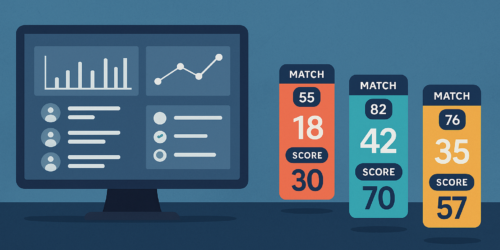What's in this article?
In today’s competitive sales environment, leveraging predictive AI can unlock untapped potential, enhancing the effectiveness of customer segmentation. This transformation, driven by predictive lead scoring, not only boosts sales efficiency but also significantly contributes to a better ROI and overall business growth.
Understanding Predictive Lead Scoring
Predictive lead scoring is a process that utilizes AI to analyze data and predict which leads are most likely to convert. Unlike traditional methods that rely on static criteria, predictive lead scoring uses a dynamic set of algorithms to generate accurate scoring metrics. This enables sales teams to prioritize quality leads based on real-time insights, which is a game-changer in optimizing sales efforts.
Predictive AI models dig deep into historical and current customer data, analyzing patterns and outcomes. By doing so, they provide a more refined approach to lead scoring, enabling teams to focus efforts on the highest-value prospects. The outcome is a streamlined sales process where resources are allocated efficiently and effectively.
Why Customer Segmentation Matters in Sales
Customer segmentation involves dividing a customer base into groups that share similar characteristics. This is crucial in tailoring sales strategies, allowing teams to target specific segments with customized marketing efforts. Proper segmentation results in a more personalized customer journey, which enhances the chances of conversion.
Successful segmentation examples include companies that have moved from generic marketing messages to highly targeted campaigns. For instance, a finance company might use segmentation to tailor their messaging for different income brackets, thereby increasing their appeal to each segment’s unique needs and preferences.
How Predictive AI Refines Customer Segmentation
Predictive AI refines the process of customer segmentation by introducing high precision in classifying leads. Through sophisticated algorithms, AI can analyze large datasets rapidly, identifying subtle trends and patterns that might be missed by human analysts. This allows for the creation of dynamic customer profiles that evolve over time, staying relevant with changing customer behaviors.
Incorporating real-time data analysis, AI ensures that segmentation efforts remain accurate and responsive to market changes. The result is a more robust and agile sales strategy that can adapt swiftly to new opportunities and threats.
Implementing Predictive AI Tools: A Strategic Approach
Integrating predictive AI tools into existing systems requires a strategic approach. The first step involves identifying the right tools that align with your business objectives. Next, it’s important to ensure that these tools are easily implementable within your current workflow without causing disruptions.
Common challenges in this integration process include resistance to change from sales teams and the technical hurdles of integrating new software with legacy systems. However, these can be mitigated through comprehensive training programs and choosing tools that offer seamless integration capabilities.
The ROI of Enhanced Segmentation through Predictive AI
The use of predictive AI in lead segmentation has demonstrated significant ROI improvements across various industries. By focusing on high-probability leads, companies can accelerate their sales cycles and close deals more efficiently. Case studies have shown that businesses adopting predictive lead scoring see substantial enhancements in conversion rates and overall sales performance.
Industry-specific applications vary, but the benefits are universal: increased efficiency, reduced waste, and higher revenue. These outcomes underscore the transformative impact predictive AI has on business operations, making it an indispensable tool in modern sales strategy.
FAQs on Predictive Lead Scoring and Customer Segmentation
1. What is the primary benefit of predictive lead scoring?
Predictive lead scoring improves efficiency by accurately identifying high-value leads, allowing sales teams to focus their efforts where they are most likely to succeed.
2. How does predictive AI support dynamic customer segmentation?
By continuously analyzing real-time data, predictive AI keeps customer profiles up to date, ensuring that segmentation is always relevant and precise.
3. Can predictive AI integrate with existing CRM systems?
Yes, most predictive AI tools are designed to integrate smoothly with popular CRM systems, enhancing their functionality without complicating existing workflows.
4. How soon can businesses expect to see ROI from predictive AI investments?
Many businesses report seeing measurable improvements in sales and ROI within a few months of implementing predictive AI solutions.
5. Are there any industries where predictive AI is particularly effective?
Predictive AI is especially beneficial in industries that handle large volumes of leads, such as finance, real estate, and ecommerce, where it can significantly enhance targeting and conversion strategies.
Explore Further with ProPair
Maximize your lead potential with cutting-edge AI insights. Explore ProPair’s predictive solutions today to see how you can enhance your customer segmentation and boost your sales efficiency.



